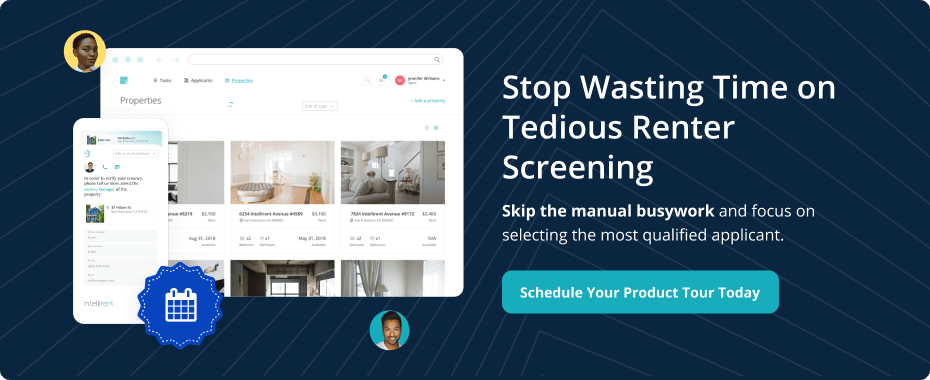June 13, 2023 • 5 min read

Have you ever had a tenant who seemed perfect on paper but turned out to be a nightmare in reality? If you’re a property manager, you likely know the frustration and financial burden of problem tenants.
The truth is, many property managers struggle with tenant screening: It’s time-consuming and high-risk. One bad decision can have major consequences. Thankfully, there’s a better way. Minimize your risk of accidentally signing a problem tenant by improving your tenant screening process.
That's why we've created this article - to provide you with helpful tools for property management tenant screening. Whether you're a seasoned property manager looking to improve your screening process or a newcomer to the real estate industry, you'll learn the tenant screening process and have the tips and tools you need to streamline your own process.
What is Tenant Screening?
Tenant screening verifies an applicant’s financial history and background before they can move into your property. The “old school” tenant screening process was a completely manual process involving paper applications, emails or faxes, and phone calls to employers or past property owners or managers to validate records.
Thanks to tenant screening software, most modern tenant screening processes automate a lot of the manual research out of the leasing process. Digital tenant screening processes aren’t just more streamlined than traditional ones; they’re often more thorough, as well.
Software efficiently scans applications, uploaded documents, identification forms, and other applicant-provided materials to look for errors or suspicious activity the human eye might miss, like photoshopped images or minor discrepancies between addresses or names. It also adds a level of security to the process, protecting the applicant’s sensitive information and helps prevent data errors caused by manual entry.
Whatever approach your property management (PM) company takes, having a robust screening process that harnesses the power of technology will only improve your process.
Why is Robust Tenant Screening Important for Property Managers
As a property manager, you want to create a pleasant living situation for all your tenants. Thorough tenant screening helps predict if a given applicant is likely to be a good renter, which can help you avoid costly property damage or even litigation.
On the flip side, the benefits of robust tenant screening go far beyond making sure you have good tenants in your properties. Happy tenants are also far more likely to renew their leases and stay long-term. Good, long-term tenants mean fewer vacancies for your PM’s to fill and less turnover to manage, ensuring a steady cashflow for both property managers and owners.
How to Build a Tenant Screening Process for Property Managers
Following a proven property management screening process is the best way to save time and ensure you give every prospective tenant an equal opportunity to pass approval.
Here are seven tips to improve your tenant screening process:
1. Use Your Rental Landscape To Set Your Renter Criteria
Your rental criteria, or the minimum requirements you want a tenant to meet, should be determined by both federal and state laws and the current real estate market. While certain requirements are non-negotiable under federal law, like not discriminating based on race, color, religion, or sex, others are at the PM’s discretion.
You know your current market environment and what type of tenants you want to attract and can set your criteria accordingly. Factors like credit score, pets, and income threshold are yours to determine. The key is to hold every applicant accountable to these same standards, whatever you decide they should be.
2. Make the Application and Documentation Process Easy
Setting clear criteria for renters helps automatically filter poor-fitting applicants from your pool. However, that still leaves you with many applications and documentation to validate.
Make it easy on candidates–and yourself!– by allowing applicants to complete applications, submit documentation, and answer any preliminary questions in one platform. This makes it easy to sort through their information and verify documents. In addition, some advanced tenant software platforms, like Intellirent, can detect and notify you about suspicious records or information, making this process even more efficient.
3. Always Check Credit Reports
In addition to using the applicant’s provided information, checking a person’s credit history can reveal much about an applicant’s financial tendencies (like whether or not they have a history of paying rent on time). Several online services offer free or low-cost credit reports to help PMs in this way.
Depending on your location, you may need a prospective tenant’s permission to pull their credit report. If you’re in a state that requires this, add a checkbox or permission waiver to your application.
4. Verify Income & Employment
In addition to good credit, you want tenants with verifiable income or a stable job. This stability ensures that the applicant can make rent consistently and is a good sign that sticking to agreements is important to them.
Not every applicant will have a long-term job (think, inheritance beneficiaries, celebrities, etc.), but every tenant should have verifiable income. Requesting things like paystubs, past W2 records, or the phone number of their employer can help you validate your prospective renter’s financial status.
5. Verify Rental History
While details like evictions or loan defaults would likely flag on a preliminary background check, many details you would want to know as a PM won’t.
Court mandates and policy changes might keep you from seeing information like misdemeanors, juvenile convictions, or other indicators of a potential problem tenant you wouldn’t know without talking to someone who does know them.
We wouldn’t recommend speaking to personal friends or family of the applications who will likely give them a glowing review; reaching out to their past property managers is helpful and perfectly legal.
6. Review Application Questions & Documentation
While a thorough property management tenant screening process reduces the opportunity for application fraud, it’s still vital to carefully examine the applicant’s responses to questions, documentation, verifications, and reports and ensure the data aligns.
7. Evaluate and Choose the First Qualified Applicant
You already set clear rental criteria in step 1. Though it could be tempting to assume that every applicant that reaches this final step meets your criteria, they might not. Your criteria may go beyond credit scores and a healthy rental history or the career a potential renter has, the pets they house, multi-person living situations, or even vehicle considerations.
Once you find a candidate that meets your criteria and has passed steps 2-6, approve them! Passing the first qualified applicant ensures that your screening process is fair and eliminates any pretense of discrimination. While the software will keep applications organized and secure, keep track of completion dates to help you keep a fair, rolling approval process.
Improve Your Property Management Tenant Screening Process With Intellirent
These seven tips and tricks will improve your tenant screening process whether you use a digital screening process or not. However, software and tenant screening technology can help automate many of these steps for you, expediting the process and helping you fill vacancies faster with qualified candidates.
Intellirent’s leasing tools, like Renter SmartMatch, remove friction and expedite the tenant screening process so you can approve high-quality tenants in hours.
But don’t take our word for it. Lindsay Victory from The Rental Girl, says, “One of the most time-consuming aspects of tenant screening is the back and forth [....] Every mishap causes a delay, and these delays add up to a lot of costly time for both the renter and the landlord. Intellirent is a game-changer. Coupled with our hands-on, personalized approach, it’s a win-win for all.”
For more information about Intellirent or how our suite of leasing tools can help, schedule a product tour today.
Published by Intellirent
June 13, 2023
Related Articles
May 09, 2023 • 7 min read
Subscribe For Insights
Get actionable leasing tips, tools, and best practices directly to your inbox. Don't miss out on the insights that'll help your team confidently find, screen, and approve the most qualified renters.


